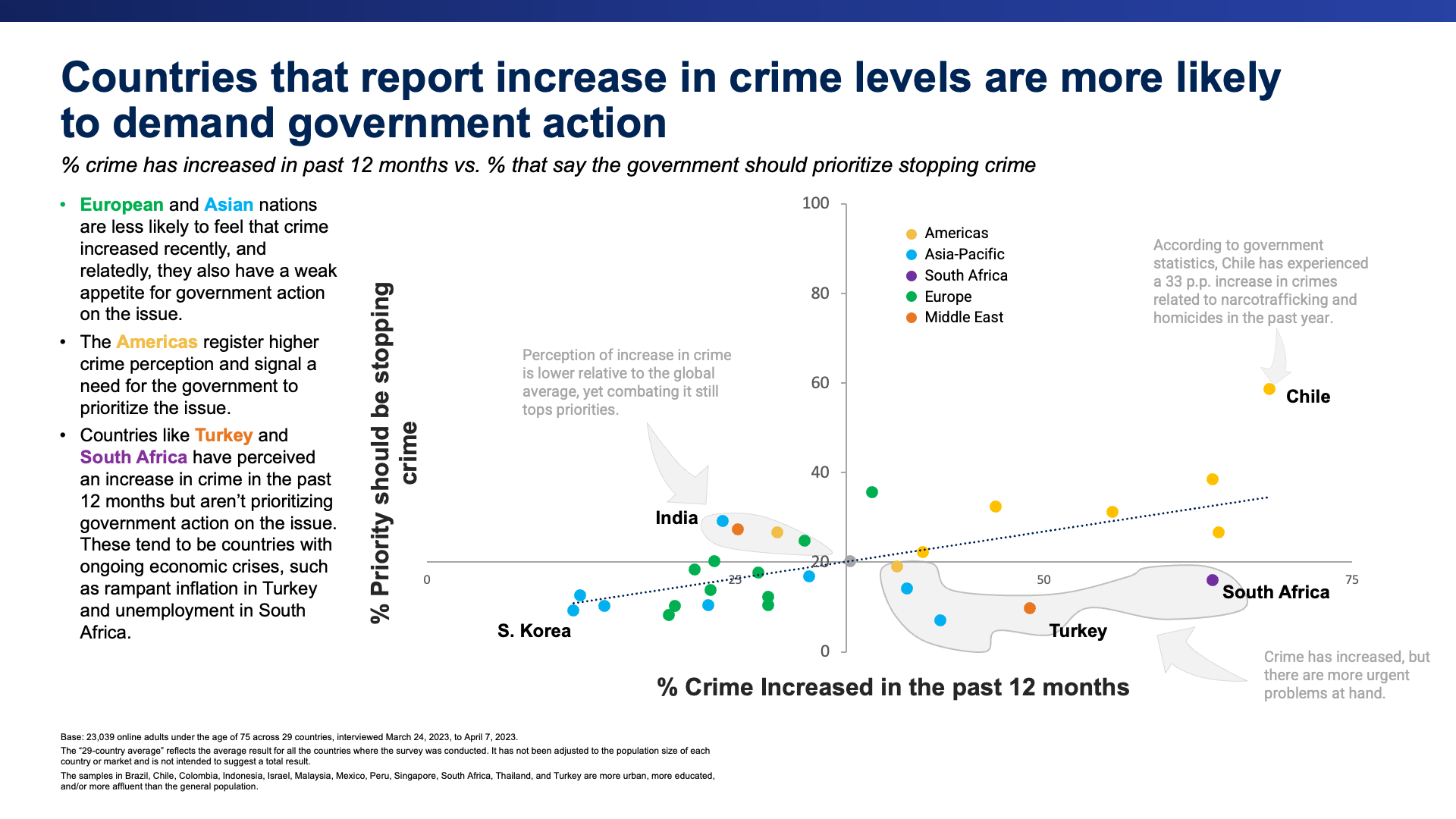One in three globally report rising crime, violence in their neighborhood
The latest global Ipsos survey on perceptions on crime and law enforcement across 29 countries finds that many around the world report a range of crimes in their neighborhood, from vehicle theft and people using illegal drugs to assault and gangs.
Other findings include:
- On average among the 29 countries polled, vehicle thefts (50%) and illegal drug consumption (50%) were the most reported crimes occurring in people’s neighborhoods out of the 10 crimes polled. Under half reported violence against women in their neighborhood (40%), followed by violence against children (36%) and violence against men (34%).
- When it comes to the government prioritizing issues, three times more people on average globally (57%) want to see their government prioritize the economy over stopping crime (20%). Countries that are more likely to report a rise in crime in the last 12 months are more likely to want their governments to prioritize fighting crime.
- On average across 29 countries, only half are confident that law enforcement can stop violent or non-violent crimes.
- Similar shares are confident in law enforcement arresting the correct person after a crime and treating all citizens with the same level of respect.
The survey was conducted by Ipsos on its Global Advisor online platform between March 24 and April 7, 2023, among 23,039 adults under the age of 75.[1]
Perceived Incidence of Crimes
In the 29 countries polled, around half of all respondents report seeing or hearing of crimes like vehicle thefts (50%), illegal drug use (50%), vandalism (49%) and burglaries (45%) in their neighborhood. Just over a third reported violence against women (40%), men (34%), or children (36%). On average, 39% say they have seen or heard about groups or people linked to drug trafficking in their neighborhood, while 32% say they have seen or heard about the presence of gangs in their communities.
Respondents in every country are more likely to report that crime was increasing rather than decreasing in their neighborhood in the past 12 months, though in 21 out of the 29 countries, more respondents say that crime levels stayed the same.
Perceived levels of violent crimes are notably higher across some of the countries polled. Reported violence against women is most prevalent in South Africa (68%), Turkey (65%), and Peru (63%). Indonesia stood out among all 29 countries in terms of violence against minors, with 66% of people reporting violence against minors taking place in their communities. Violence against men is most reported in South Africa (55%), Brazil (55%), and Thailand (54%).
Countries with the highest levels of reported violence in their communities tended to be in South or Latin America, while countries with lower rates of perceived violence tended to be in Europe.
In most of the 29 counties, reported violence against women is more likely to be reported by women, while perceptions of violence against men is more likely to be reported by men. Violence against children is more likely to be reported by women.
Japan stood out as an outlier for its lack of perceived criminal activity. In all the categories of crime asked, respondents in Japan are among the least likely, if not the least likely, to say that the crime occurred in their neighborhood.
Confidence in law enforcement
On average across all 29 countries, around half are confident that law enforcement in their neighborhood can stop violent (50%) or non-violent (48%) crimes from happening and find and arrest the correct criminal after a crime (53%).
Respondents in Singapore are by far the most confident in their law enforcement, ranking first in respondents’ stated confidence in their law enforcement’s ability to stop violent crimes (76%), non-violent crimes (78%), finding and arresting the correct criminal (78%), and treating all citizens with respect (80%). In contrast, South Africa ranks last among all 29 countries in respondents’ confidence in their law enforcement to stop violent (30%) or non-violent crimes (30%), find the correct criminal after a crime (32%), and treat all citizens with the same level of respect (35%).
Most would rather prioritize creating jobs, boosting the economy than fighting crime
Most respondents across the 29 countries preferred that their governments prioritized creating jobs and boosting the economy (57%) or protecting local citizens’ health and environment (23%) rather than stopping or reducing crime (20%). The same was true in every other country, with the exception of Chile.
Countries that reported an increase in the levels of crime tended to be more likely to demand government action on stopping crime. Respondents in countries such as Turkey and South Africa have perceived an increase in crime in the past 12 months but aren’t prioritizing government action on the issue. These tend to be countries with ongoing economic crises, such as rampant inflation in Turkey and unemployment in South Africa.
European and Asian nations are less likely to feel that crime increased recently and have a weak appetite for government action on the issue. Meanwhile, the Americas register higher crime perception and signal a need for the government to prioritize the issue.

About the study
These are the results of a 29-country survey conducted by Ipsos on its Global Advisor online survey platform and, in India, on its IndiaBus platform, between Friday, March 24 and Friday, April 7, 2023. For this survey, Ipsos interviewed a total of 23,039 adults aged 18 years and older in India, 18-74 in Canada, Israel, Malaysia, South Africa, Turkey, and the United States, 20-74 in Thailand, 21-74 in Indonesia and Singapore, and 16-74 in all other countries.
Notes
[1] All countries surveyed adults under the age of 75 with the exception of India where the adult 18+ population was surveyed.



